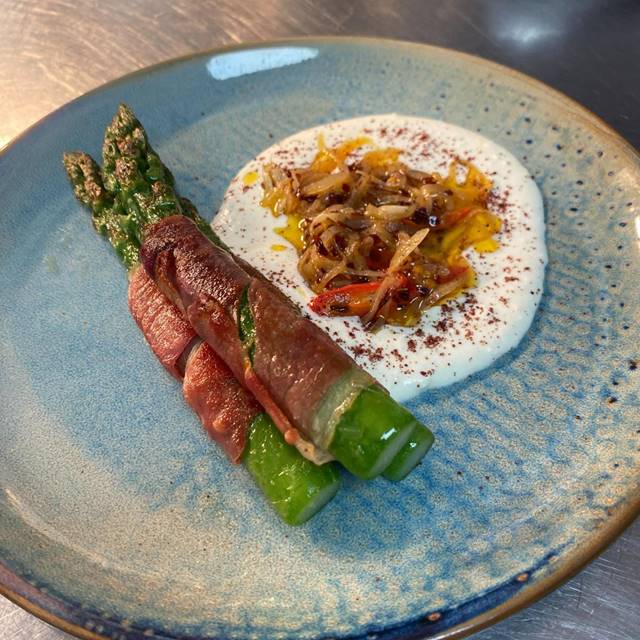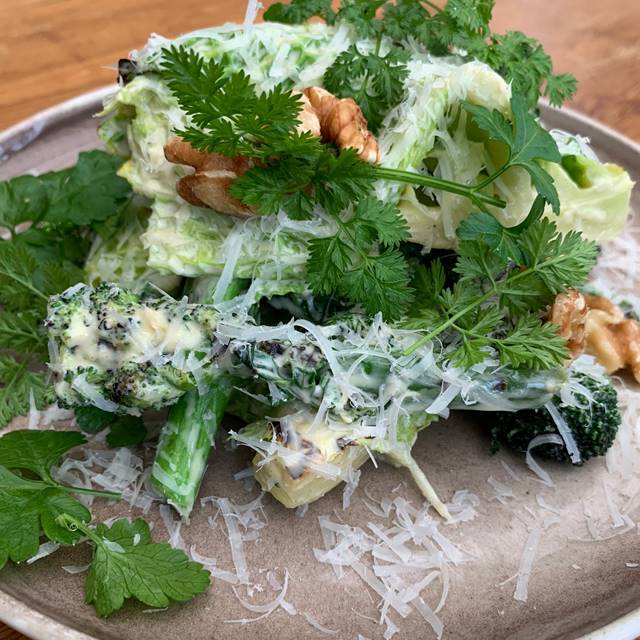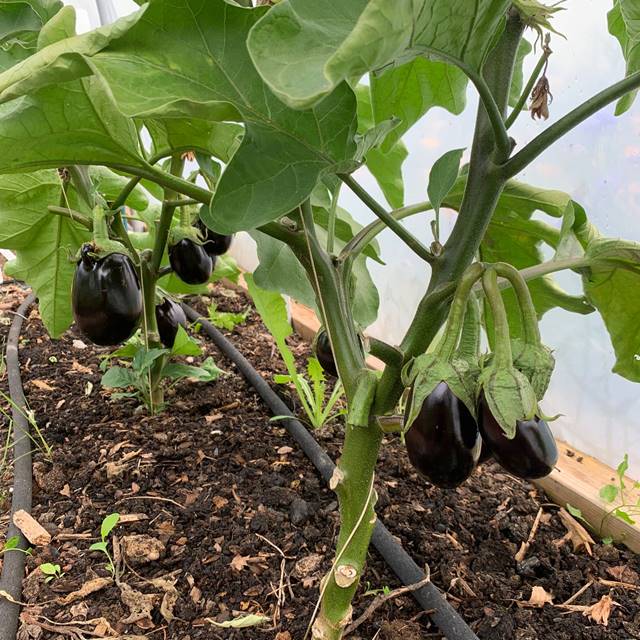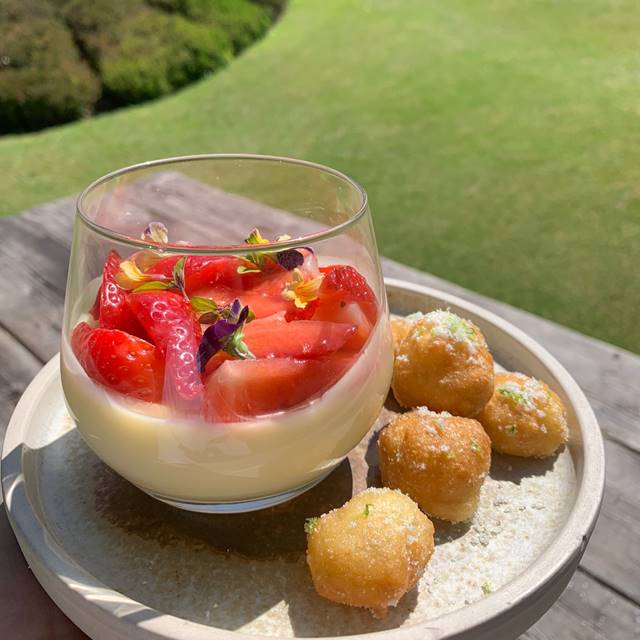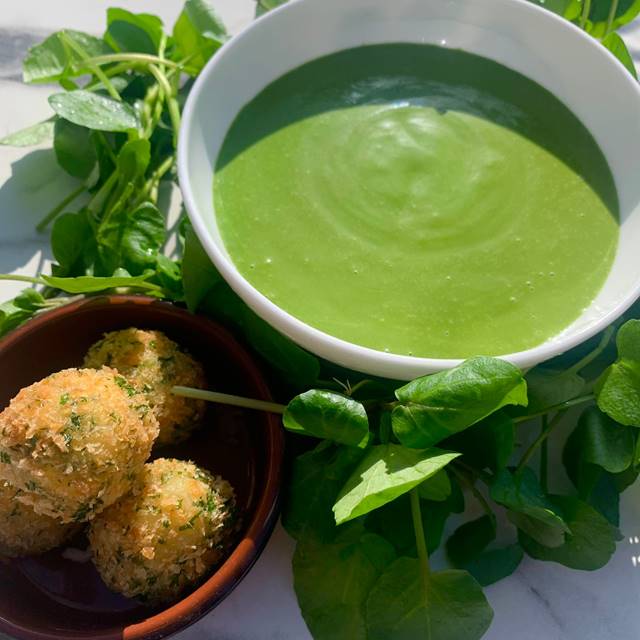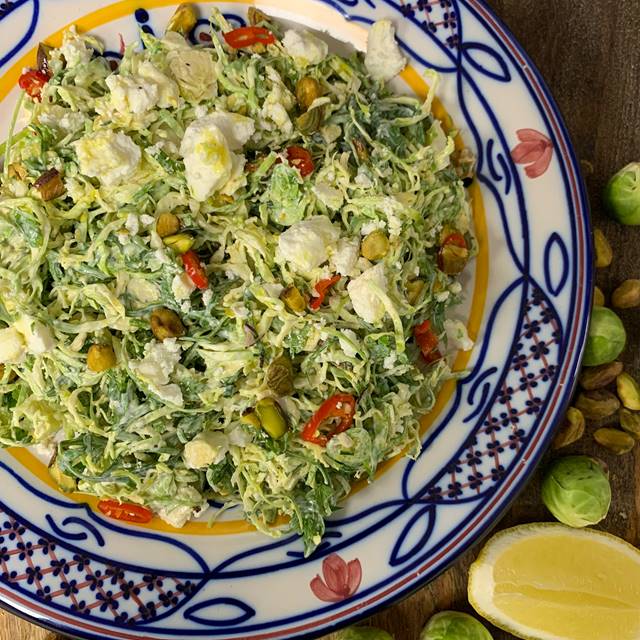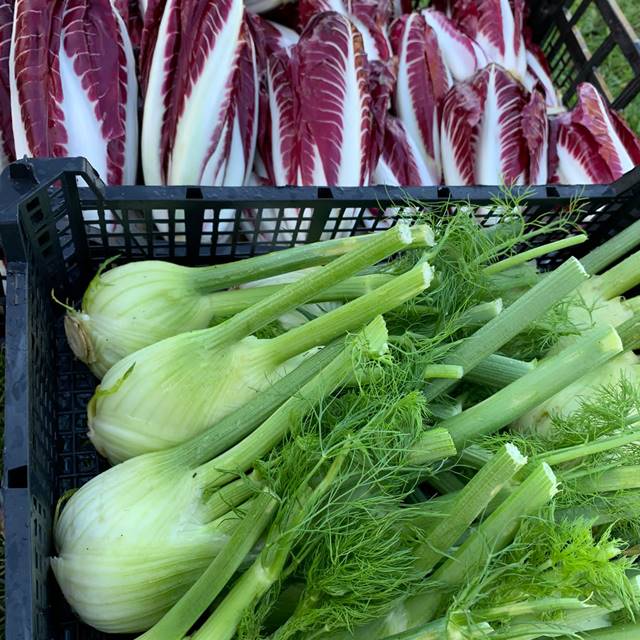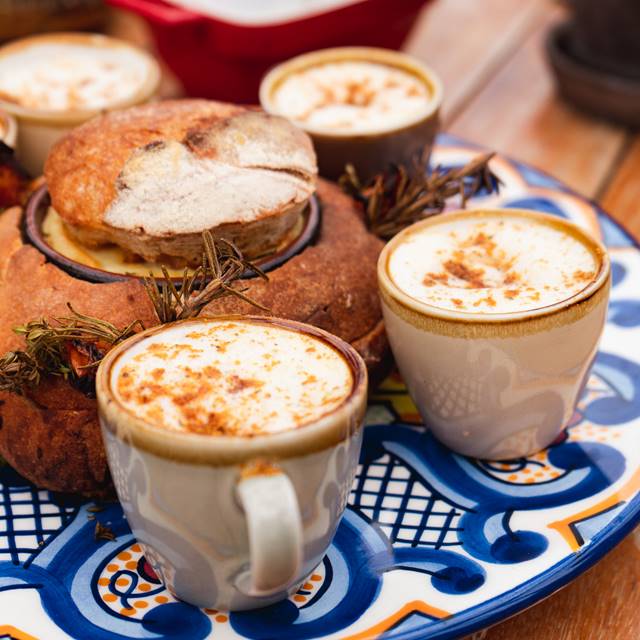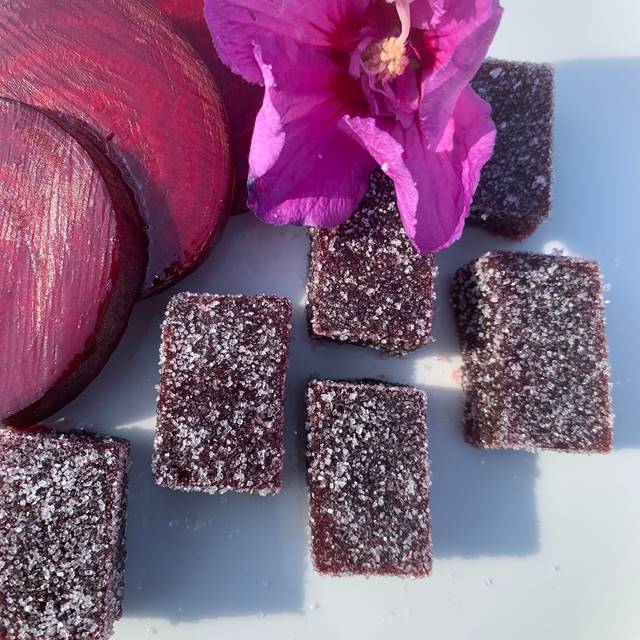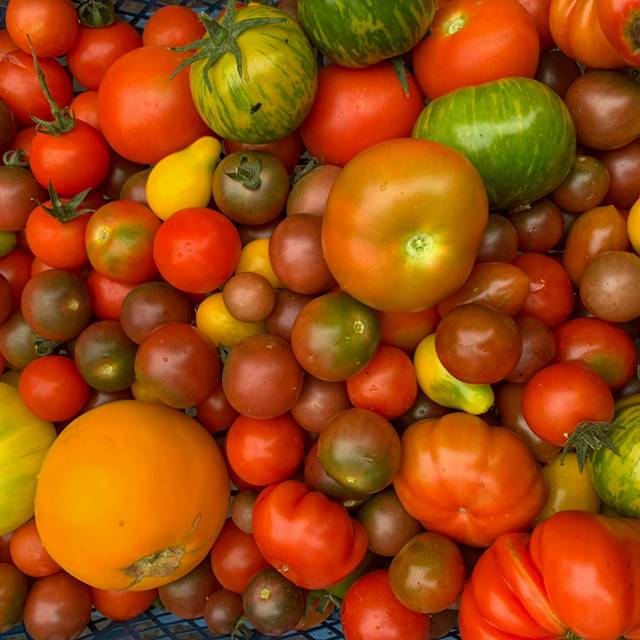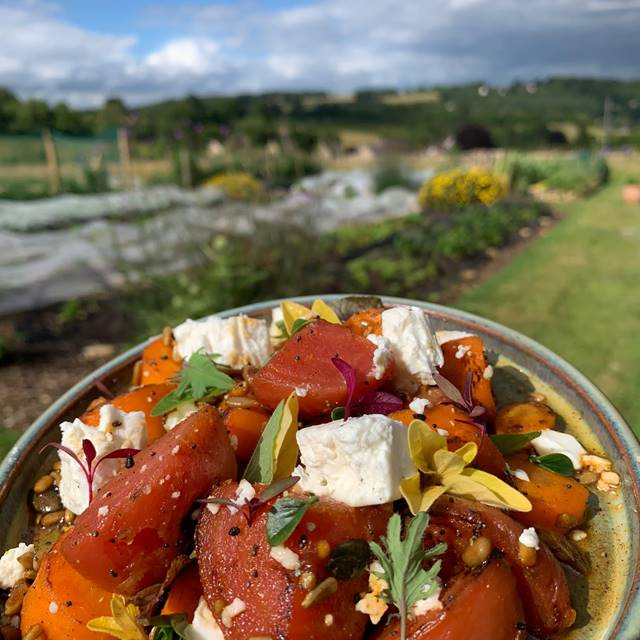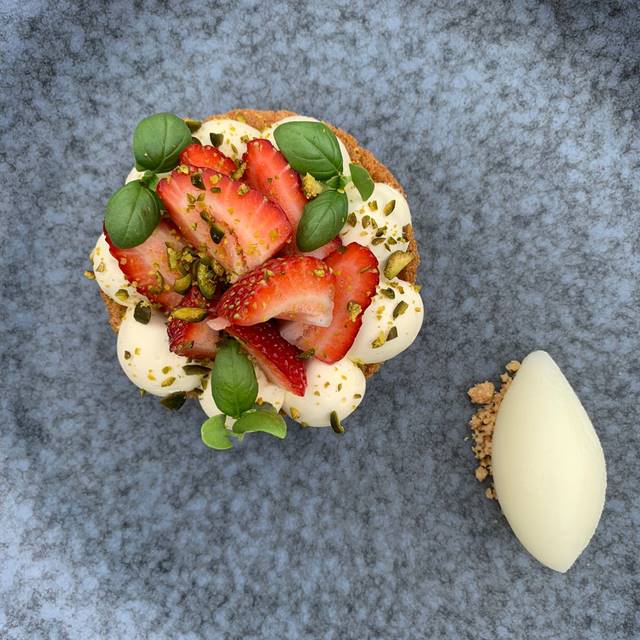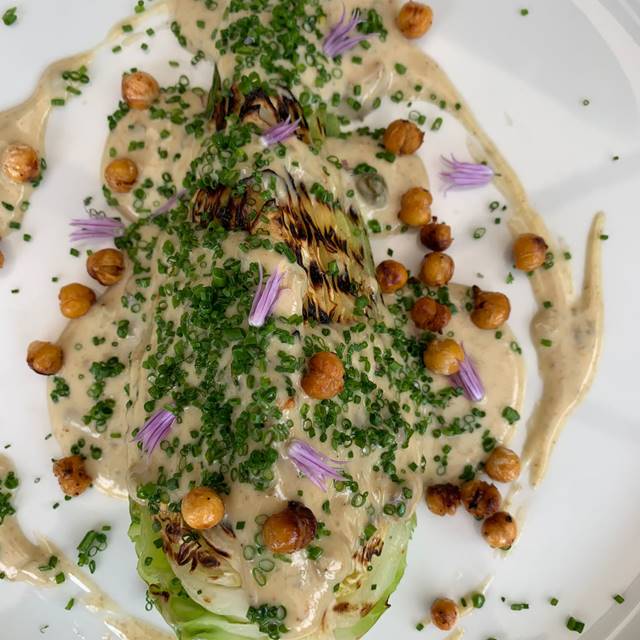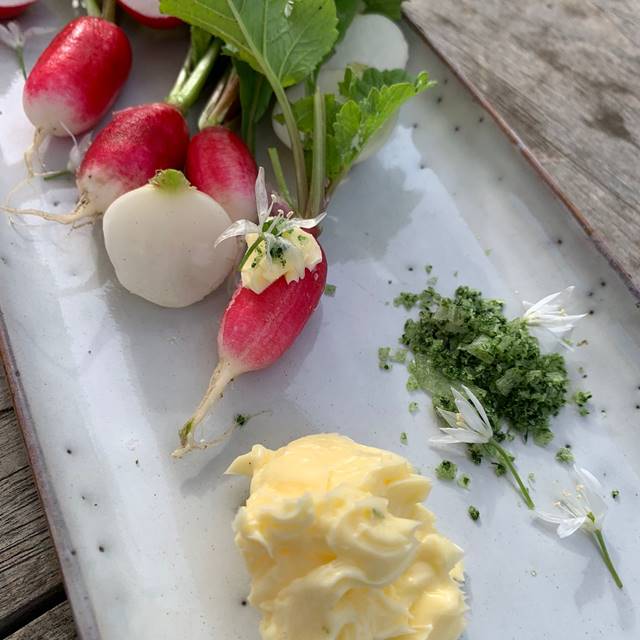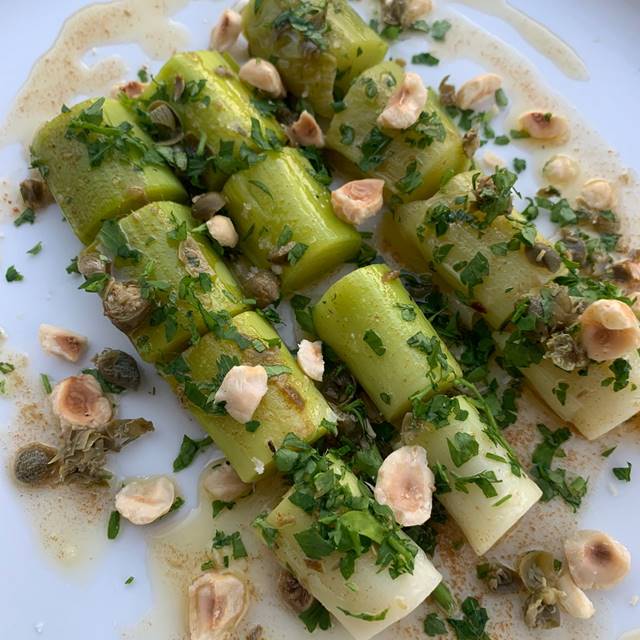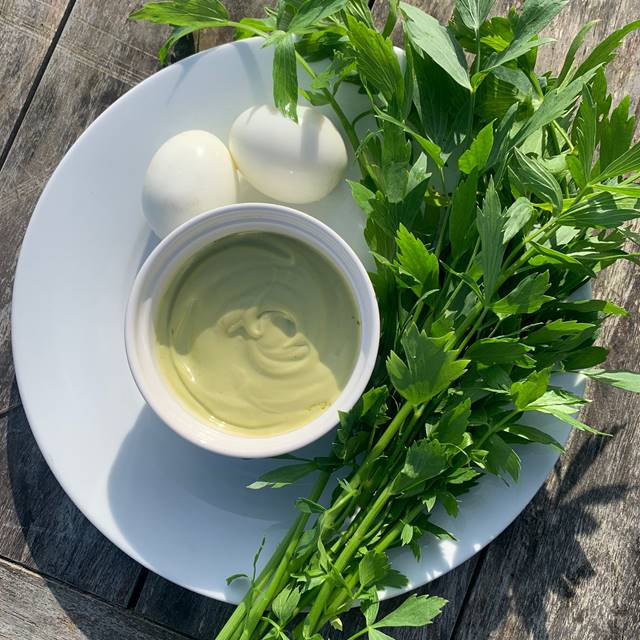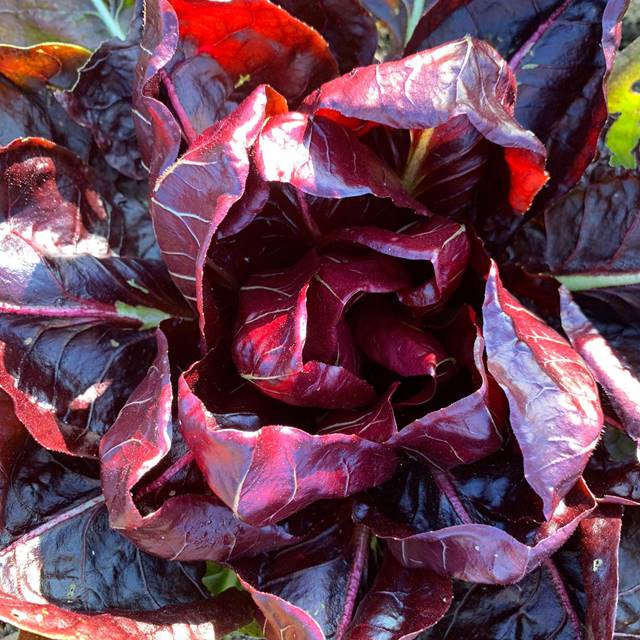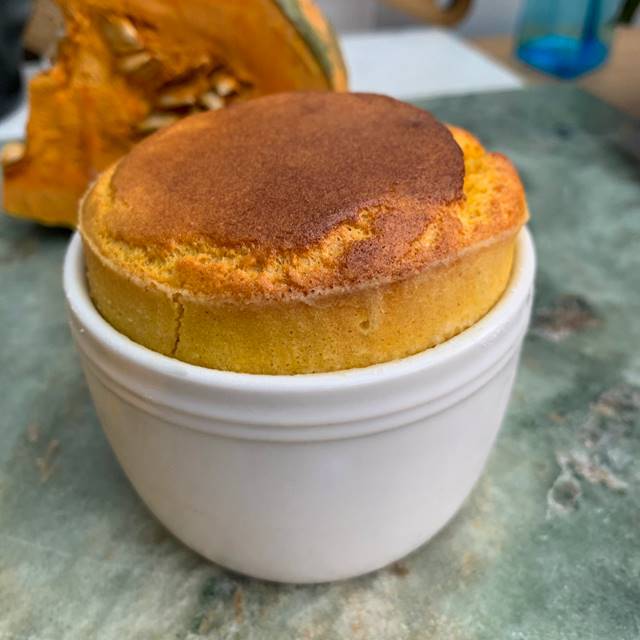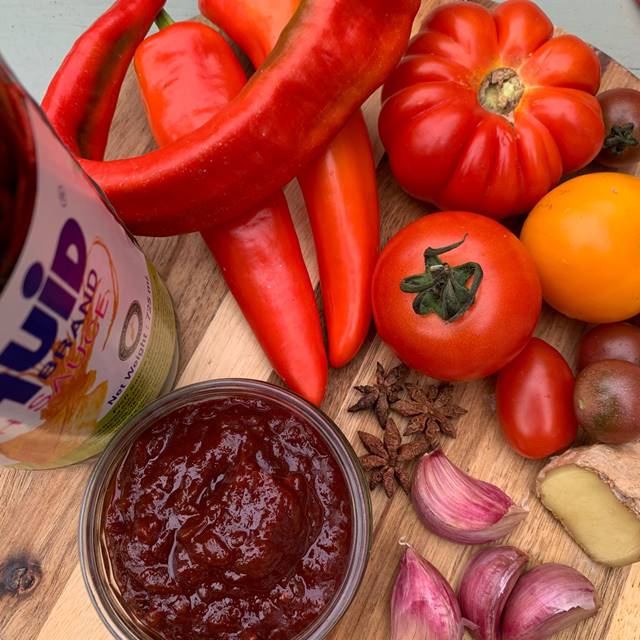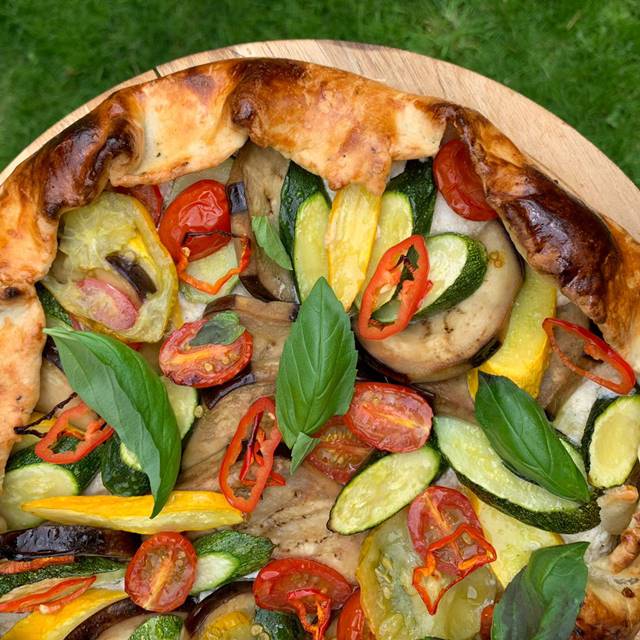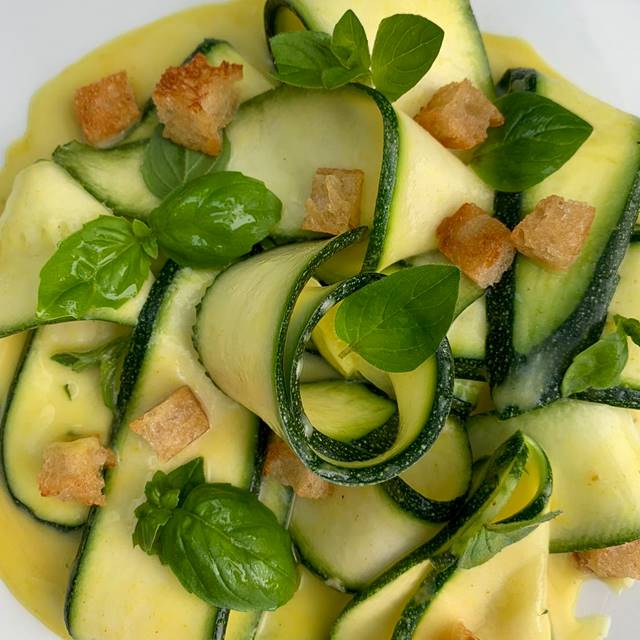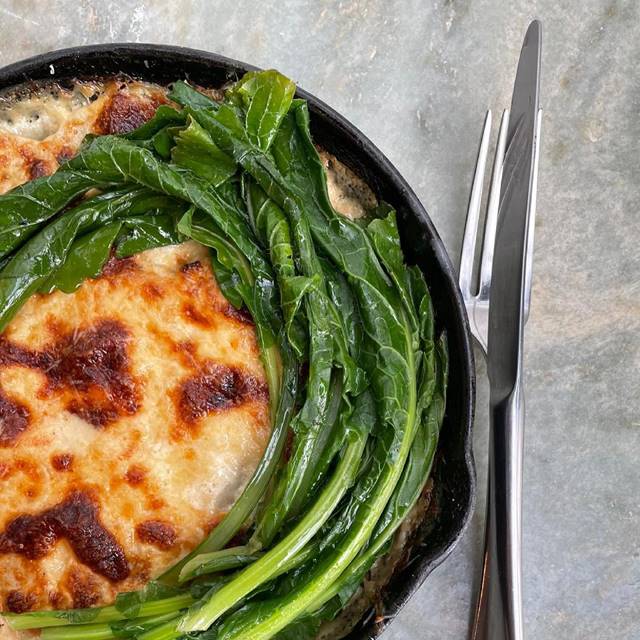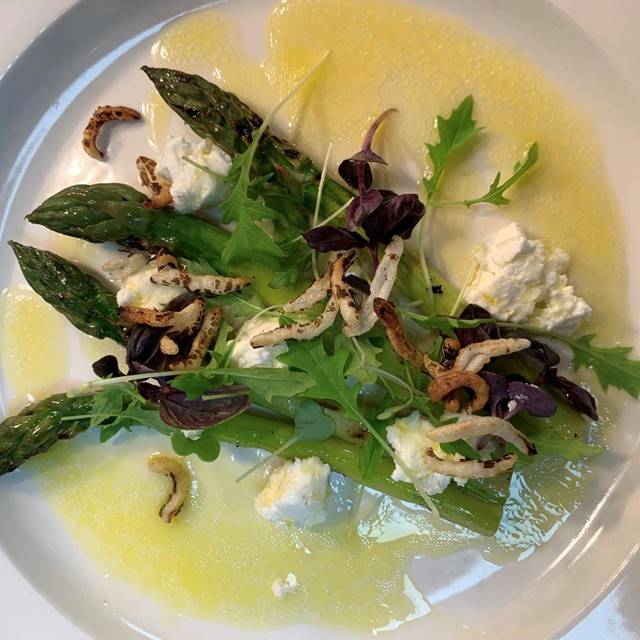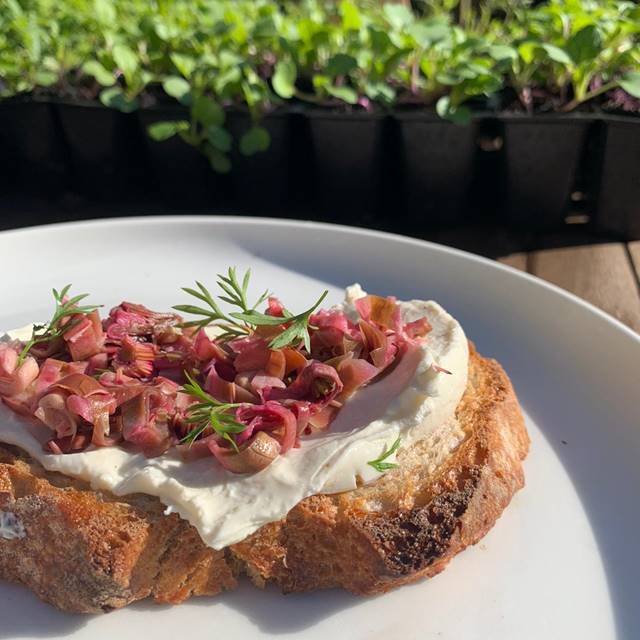Recipe recommendations
No-dig inspired
Each month I'll share one of my favourite recipes to this page, focusing on the ingredients that are ready to pick that month.
Be sure to share and tag your triumphs @homewoodbath
Darren Stephens, Chef-Gardener
April 2025
Salad Dressing
For me there is often nothing better than a plate of well-dressed leaves. As we crash eagerly into salad season rather than a recipe I thought I would write up my thoughts on a perfect green salad.
I was always taught the classic ratio of 3 to 1 of oil to vinegar for a dressing, but after eating a lot of salad, you can rely too much on that ratio and not enough on your tasting judgement, as all salads are different.
You will need
Good quality extra virgin olive oil
Wine vinegar
Salt
Selection of washed leaves, the more colour and texture, the better
Put your leaves in a nice big bowl with room to toss
Add a few splashes of vinegar and, with one hand, toss it around to coat the leaves, but don’t drench it!
Taste it, it should be both green and slightly acidic
Season with fine salt
Taste it again, you should be able to taste the leaves, vinegar and salt. You could easily leave it there.
But for that luxurious mouthfeel, drizzle over the oil, thinking about what it may add or take away from the salad, depending on how bitter it may be. It's a bit of a balancing act. Toss again with one hand so the oil coats everything evenly. Salad-tossing utensils are no substitute for hands
Taste it one more time and serve straight away.
March 2025
Tandoori carrots
This is a recipe from our last Soil to Fork series. If you missed it, be sure to check it out on our Instagram page. Our carrots are long finished now, but it’s a nice little dish that can be cooked up anytime of year, particularly nice when it’s chilly outside.
Serves 4
2 tbsp curry powder
1 garlic clove finely grated,
125g Greek yogurt,
5 tbsp olive oil
500g small carrots, tops trimmed, scrubbed
2 tbsp lemon juice
Preheat oven to 250C. Mix curry powder, half of garlic, half the yogurt, and 3 tbsp oil in a large bowl until smooth; season with salt and pepper. Add carrots and toss to coat. Roast on a rimmed baking sheet in a single layer, turning occasionally, until tender and lightly charred in spots, 25–30 minutes.
Whisk lemon juice, remaining garlic, and remaining yogurt in a small bowl; season with salt and pepper.
Place carrots, along with the crunchy bits, on a baking sheet on a plate. Top with yogurt mixture, coriander and serve with lemon wedges, seasonal salad and if you have the time a light coconut curry sauce.
October 2024
September 2024
COURGETTE AND BASIL BREAD
Most keen growers I speak to either struggle with courgettes, mainly due to slug damage, or have so many they don’t know what to do with them. If you are in the latter group then this is a lovely way of utilising them. I served this with hummus and garden crudités at our harvest dinner at Bishopstrow with some lovely feedback.
450g courgettes
2 tsp salt
125g plain flour
125g spelt flour, whole wheat
2 tsp baking powder
1/2 tsp sodium bicarbonate
1 tsp salt
4 spring onions finely sliced
30g basil roughly chopped
100g of grated cheddar
2 large eggs
170g buttermilk
Grate the courgette and mix with 2 tsp of salt and leave to sit in a colander over the sink for 30 mins. Squeeze the courgette to release all the excess liquid and set it to one side. In a large bowl mix together the dry ingredients until well combined. Add the courgette, basil, spring onion and cheddar and mix together lightly. Separately whisk the eggs and buttermilk together. Then fold the buttermilk and egg mixture into the dry ingredients, mixing only until just combined – any more and the bread could turn out tough. Fill small loaf tins three-quarter way full and bake for 45 minutes at 180C or until a small knife inserted comes out clean. Leave to cool completely before removing from the loaf tin.
August 2024
FIG LEAF PANNA COTTA WITH RASPBERRIES, WHITE CURRANTS AND HONEY
We have two big fig trees in the river garden along the south-facing wall. We planted them two years ago now and I’m hopeful of some fruit later this year. In the meantime, we can utilise the leaves of which they have plenty. Along with our raspberries which we have just started to pick
Serves 6
Panna cotta
1 litre double cream
4 fig leaves
160g sugar
3 gelatine leaves
Warm the cream till just below boiling point, add the fig leaves, and remove them from the heat. Leave the leaves to infuse overnight.
Soak the gelatine leaves in cold water until bloomed. Strain the leaves out of the cream and bring back to a boil with the sugar, stirring to dissolve. Remove from the heat to cool slightly. Squeeze the excess water from the gelatine and add to the cream, whisking to dissolve it completely. Pour into moulds and set overnight.
Once set dip the mould into warm water and tip.
June 2024
PAN ROASTED CARROTS WITH CARROT TOP SALSA VERDE, BABY VEGETABLES AND SEARED SQUID
Serves 4
I recently did a cooking demo at the Bath Foodie festival and of course, I was showcasing all the abundant produce from our kitchen garden. The star of the show is the whole carrot with the squid in more of a supporting role.
1 bunch of young carrots with tops
30g parsley
30g mint
4 spring onions sliced fine
20g capers
1 lemon
Olive oil
1 tsp Sriracha
5 pickled chilli peppers and their liquid
180g cleaned squid, tubes sliced into rings and tentacle halves
100g roasted and salted pistachios chopped
1 bunch baby beetroot cooked and peeled
Baby courgettes
Cut the young feathery green tops from the carrots, and discard the thicker stems and older leaves. Wash well and dry. Chop the carrot tops, parsley and mint together and add the spring onions, capers, zest of a lemon, sriracha, chopped chilli and two tablespoons of its liquid. Stir in enough olive oil to bind it and season. It should be bright and bracing.
Heat a heavy pan on medium heat and slice the carrots in half if quite large or leave whole if small. Lay the carrots in the pan with some olive oil so they sizzle and caramelise, they will need about 15 minutes to cook through.
Put the carrots to the side when cooked and turn the heat up high on the same pan. Season the squid well and add to the pan when very hot with a glug more of olive oil. Toss and shake the squid in the pan, it should take no more than two minutes to cook. Finish with a good squeeze of lemon and add to the carrots and mix with the carrot top salsa verde and let marinade for a few minutes.
Any other vegetables can be added to this bright dish, I utilised baby heritage beetroots and very young courgettes with their flowers.
Arrange the dressed vegetables and squid around a plate and sprinkle with the pistachios and another drizzle of olive oil.
April 2024
ASPARAGUS, WHIPPED FETA, SHALLOT SALSA
Our only perennial vegetable, asparagus, now in its fourth year, should yield a bountiful harvest. The vibrant green spears shoot up from the ground, offering a delectable treat until the summer solstice, after which they're left to flourish into fern-like foliage, replenishing the plant's energy for the next season. You’ll find this dish on the menu at Homewood throughout spring.
Whipped feta
225 feta
175 greek yogurt
1/2 juice of lemon
Shallot salsa
4 shallots peeled and thinly sliced
2 chillis thinly sliced
3 gloves garlic peeled and thinly sliced
1/4 tsp chilli flakes
300ml light olive oil
Asparagus
Serrano ham
For the whipped feta simply blend all in a food processor until smooth.
To make the salsa put all ingredients apart from the oil into a heat proof bowl. Heat the oil till very hot and pour over the rest of the ingredients.
Blanch the asparagus for one minute in salted boiling water and refresh in iced water.
Wrap the asparagus individually in the ham and when ready to serve fry in a pan crisping up the ham. Serve warm
February 2024
GRILLED PURPLE SPROUTING BROCCOLI, ROAST GARLIC AND PECERINO EMULSION WITH HERBS AND WALNUTS
One of my top ways to enjoy brassicas is by quickly blanching them, then finishing on the char-grill. Their sturdy texture and rich flavour make them a perfect match for bold flavours, like this new favourite dressing of mine. For me PSB rival asparagus for anticipation and taste and is the hi-light in the garden over February and March. We also have savoy cabbages in the garden that work great in this salad too.
1 large bulb of garlic
1tbsp dijon mustard
1 tbsp white miso paste
2 egg yolks
1 lemon juiced
50g pecorino grated
250ml neutral flavoured oil
Sprigs of dill chervil and mint
Large handful of walnuts
Sprouting broccoli lightly blanched for 30 seconds
To make the dressing wrap the garlic bulb in tin foil and bake for 20 mins at 180C or until it is soft to touch. When cooled remove the foil and slice the very top off and proceed to squeeze the caramelised cloves out of its roasted shell.
Add this to a food processor along with all the ingredients except the oil. Blend till all have been combined and with the motor running slowly pour in the oil. It should emulsify together to form a Caesar style dressing.
To take the walnuts to another level they are candied. For this simply boil 200g of water with 200g of sugar and add the walnuts. Simmer for 1 minute then drain them. While still warm bake on a tray at 160C for 8 mins until toasted and shiny. Sprinkle with salt to finish.
With a char grill set to the point of smoking, very lightly dress the broccoli in oil and press on the grill to leave bar marks.
Dress the broccoli the with emulsion and plate up topping with the nuts and herbs
November 2023
WINTER SQUASH ORZOTTO
Orzo is a pasta variety that resembles large grains of rice and offers a convenient alternative to traditional risotto. The 'Crown Prince' squash variety reigns supreme in terms of flavor, but if it's not available, butternut squash makes for a suitable substitute. However, it's best to steer clear of using the Halloween pumpkin you carved. This particular recipe is currently featured as a main course at Homewood, where it is served alongside sea bass. Nevertheless, it stands strong as a delectable vegetarian option when paired with toasted nuts and a refreshing salad.
250g orzo
500ml vegetable stock
1kg crown prince squash
2 shallots peeled and diced
2 cloves of garlic
30 sage leaves, cut into ribbons
1 tablespoon butter
3 tablespoons parmesan cheese
To prepare the Squash Purée, start by deseeding and gently peeling the squash. Cut it into chunks and arrange them on a lightly oiled baking sheet. Bake in a preheated oven at 160°C for about 30 minutes or until the squash becomes tender. Let it cool slightly, then transfer it to a food processor and blend until smooth. You may need to add a little vegetable stock to help with the blending.
In a large saucepan, bring salted water to a boil and cook the orzo until it reaches an al dente texture. Drain the orzo.
Meanwhile, in a separate pan, sauté shallots, garlic, and sage in butter over medium heat for about 5 minutes. Pour in a glass of white wine and reduce it to a glaze.
Add the cooked orzo to the pan and mix in enough of the squash purée to achieve a pleasing, loose risotto-like consistency. Finish the dish by adding a knob of butter and some grated Parmesan cheese to create a silky finish. Season the dish to taste.
July 2023
TAMARIND ROASTED AUBERGINE, GREEN LENTIL DAHL
Aubergines, the smooth and shiny dark violet orbs have started to appear in the kitchen gardens once again hanging like jewellery between their large slightly furry leaves. Once I’ve finished admiring them most go to Bishopstrow Hotel where the chefs have done its beautiful vegetable justice, pairing it with tamarind and a lentil Dahl. If you don’t fancy making it then head down to Warminster where it's on the menu all summer.
2 Aubergines diced, lightly salted and pressed
Tamarind dressing
50ml veg oil
2 lemons juice and zest
70g tamarind paste
5 cloves garlic
1 tbsp coriander seeds
2 tbsp raw cane sugar
50g chopped coriander
Squeeze any excess water from diced aubergine and add to a hot frying pan with 4 tbsp of oil. Sauté until the aubergine is golden all over and transfer to a baking tray.
Make the tamarind dressing by adding all the ingredients to a blender and blending until combined. Dress the sautéed aubergine with the tamarind mix and roast in the oven for 12 mins @ 180C until sticky and glazed.
Lentil Dahl
400g dry green lentils soaked overnight and rinsed
2 white onions, small dice
400g fine-diced carrot
6 cloves garlic minced
4 tsp fresh ginger minced
2 chillis (seeds removed)
5 tsp ground cumin
5tsp
curry powder
2 tsp turmeric
3 tsp ground coriander
1400ml vegetable stock
480 coconut milk
Heat a large saucepan with 5 tbsp of veg oil and sauté the onions until soft then add the chilli, ginger, garlic and carrot. Continue to cook on low heat for 5 minutes.
Add the seasonings, lentils and vegetable stock, stir and bring to a boil for 15 minutes or until the lentils have just a small amount of bite left.
Add the coconut milk and simmer for another 10 minutes. Cool slightly and adjust the seasoning. Serve with the warm tamarind aubergines greek yogurt and more fresh coriander.
June 2023
LEMON VERBENA POSSET, STRAWBERRIES, WARM LIME BEIGNET
One of the many delights June brings is strawberries. Freshly picked and warmed by the sun… there isn’t much better. Lemon verbena is a perennial shrub that’s very easy to grow and is found in most garden centres. Its pointed leaves are heavily fragrant and perfect for infusing.
Serves 8
Lemon posset
1.15 litres double cream
350g caster sugar
150ml lemon juice
Zest of 2 lemons
20 lemon verbena leaves
Bring the cream to a boil, then stir in the sugar, verbena leaves, lemon juice and zest. Return to the boil and simmer for 1 minute. Remove from the heat and leave to infuse for 15 mins. Pass through a fine sieve into a jug and then share this between 8 suitable glasses. Leave to cool completely, then chill
Strawberries
500g strawberries hauled
75g sugar
Quarter the strawberries and mix with the sugar and leave to infuse for 30 mins.
Beignet
1 teaspoon caster sugar
A pinch of salt
50g unsalted butter
90g plain flour
100g lightly beaten egg
150ml water
Zest of 2 limes mixed with 200g sugar
Boil the sugar, salt, butter and water and add the flour. Incorporate it into a buttery liquid and mix for 2 minutes over medium heat. Transfer the hot mix to a mixer and gradually mix in the eggs at high speed. Once all the egg is added continue to mix slowly until cooled. Transfer this to a piping bag.
To cook the beignet heat oil for deep frying to 170C. Snip off the first 2cm of the bag then hold the bag vertically above the hot oil in one hand and a pair of scissors in the other squeeze out lengths of choux paste and snip them off at 5cm intervals dropping them into the oil. Deep fry for 5 mins then lift them and drain on tissue paper. When cool enough to handle toss in the lime zest and sugar. Eat straight away with the posset and berries on top.
March 2022
WATERCRESS SOUP, RICOTTA AND SMOKED BACON CROUTONS
Soup
225g leek finely sliced
175g onion finely sliced
175g potato finely sliced
1 clove garlic
75g butter
1000g chicken or vegetable stock
5g salt
100g watercress
Sweat the leek, onion, garlic and salt with no colour till soft. Add the potato and butter and sweat for 5 minutes. Add the stock and simmer for 10 mins or until the potato is soft. Pull off the heat and add the watercress and blend well immediately until the soup is bright green and smooth then pass through a fine sieve.
Croutons
200g ricotta
Zest one lemon
150g smoked bacon rashers
Chopped chives and bread crumbs
Grill the bacon until crisp, drain off the fat and let cool and chop into fine pieces. Mix with the rest of the ingredients and roll into 15-gram balls then freeze them. Once frozen hard, roll in flour then dip into some beaten egg. Finish by coating them in the breadcrumbs and chives mix. Deep fry in veg oil at 170C until golden.
December 2022
SHAVED BRUSSEL SPROUTS, LEMON TAHINI, CHILLI, GOATS CHEESE & PISTACHIO
After the hard work of growing sprouts for the best part of the year, I have a newfound appreciation for them and hate to see any post-Christmas sprouts potential wasted.
When shaved raw they are a great vessel in salads for whatever dressing, cheeses, seeds or nuts you may have in the cupboards after the festive period.
Lemon tahini dressing
120g tahini
150ml water
2 tbsp honey
2 lemons juiced
2 cloves garlic minced
Add all ingredients to a small bowl and whisk together.
500g Brussel sprouts trimmed and sliced thin
1 chilli deseeded and sliced
200g goats cheese crumbled
80g shelled pistachios
Mix all together with the lemon dressing and season well, serve and eat straight away
October 2022
SPICED WINTER SQUASH, RADICCHIO DI TREVISO, SOMERSET 'FETISH', PAPRIKA & CUMIN
The kitchen team at our sister hotel The Bird, Bath are always incredibly enthusiastic about the produce I bring to their restaurant each week and never fail to conjure up new dishes with whatever is in season from the kitchen garden.
It's the first year I have grown radicchio, it wasn’t that easy but it’s a spectacular plant. The bitter crimson leaves of the Italian chicory are paired with sweet roasted squash and local salty feta cheese.
750g winter squash (crown prince, Kuri or Queensland Blue are ideal) 1 tbsp olive oil
1/2 tsp sweet paprika 1/2 tsp onion powder 1/2 tsp ground cumin 4 tbsp maple syrup Salt
For the vinaigrette - 1 garlic clove, crushed 1 tsp Dijon mustard 50ml red-wine vinegar 200ml olive oil
1 head radicchio Feta for crumbling
Preheat the oven to 180 degrees
Peel and Cut the pumpkin into suitable size chunks removing the seeds. Place the pieces in a large bowl and coat with the olive oil, maple syrup, spices and salt. Spread out onto a baking tray and Cook for about 45 minutes until tender but not mushy.
Remove any tough outer leaves and then cut the radicchio in half and then in half again.
For the vinaigrette, stir the crushed garlic into the mustard then whisk in the red-wine vinegar. Add the oil gradually, whisking all the time, until incorporated. Dress the radicchio wedges in the vinaigrette and roast alongside the squash for 10 minutes.
Serve with crumbled feta and any roasting juices.
September 2022
WINTER SQUASH AND COCONUT CAPPUCCINO
The BBQs have been tucked away for the winter and our dining domes have now moved to the terrace serving hearty, autumnal dishes, the starter inspired entirely by the kitchen garden.
We use the variety ‘Crown prince’ for the base of the soup but butternut or similar squash or pumpkin will work fine.
Soup
2kg crown prince squash
2 tbsp olive oil
1 large onion sliced
1 carrot diced small
500ml vegetable stock
Coconut sabayon
1/2 can coconut milk
2 egg yolks
1/2 tablespoon lime juice
Salt and pepper
Garnish
200g Pumpkin seeds
Pre heat oven to 180C. Peel and deseed the squash and cut into chunks. Coat in oil and roast until golden in colour and soft in the centre.
In a suitable pan, softly fry the onions and carrot till soft. Add the roasted squash and vegetable stock. Simmer gently for 10 minutes and leave to cool slightly then blend the soup until smooth and season. The amount of liquid will vary on the type of squash used. For this recipe it needs to be quite loose so add more stock if needed.
For the coconut foam, set up a Bain Marie by placing a heatproof bowl over simmering water. Combine all ingredients and season with salt and pepper. Place mixture in the bowl above the simmering water and whisk for 5 to 8 minutes or until thick and smooth, remove from the heat and cover with cling film.
Roast the pumpkin seeds until toasted and blend until fine and almost powder-like. You may need more for your blender to be able to chop them effectively.
Heat your soup and pour into mugs two-thirds the way up and top with the foamy coconut and then top with the pumpkin seed powder.
August 2022
BEETROOT AND HIBISCUS 'VEG PASTILLES'
I served these little sweet bites as petit fours on the last pop-up kitchen garden dinner we did in August. I will always remember it as it was the only day it poured with rain the whole summer. We stood in wellies under umbrellas while I talked everything no-dig. Our hibiscus trees have just come into flower so I used fresh petals for this recipe, they have a wonderful floral blackcurrant flavour. If you can juice your own beetroot then all the better but store-brought juice will work just fine as well as dried hibiscus flowers. This recipe will make about 50 pastilles.
1-litre beetroot juice
100g white caster sugar
25g powdered pectin
1kg golden caster sugar
220g glucose
You will need a tray measuring approx 30cm x 25cm and 3cm deep lined with greaseproof paper with a little extra veg oil lightly rubbed over its surface—also an instant-read food temperature prob.
Put beetroot juice in a pan on the stove.
Mix together the white caster sugar and the pectin.
Add this mix to the beetroot juice in a heavy-based pan and whisk well then add the sugar and glucose.
Boil over medium heat whisking as often as possible. You need to keep boiling the mixture until it reads 108°C on the prob. This is the temperature it will set at, it may take a while to reach this temperature but just keep whisking and checking the temperature.
When it reaches 108°C pour it into your pre-lined tray. The mixture needs to be at least 1cm deep.
Leave at room temp to cool and set.
Once set cut into strips and then dice and roll in golden caster sugar.
July 2022
HERITAGE TOMATO SALAD, ISRAELI COUSCOUS, AVOCADO & BASIL
A staple summer salad at Homewood ever since I worked in the kitchen. Except now it features our own tomatoes and basil which are picked nearly daily this time of year. Simple, fresh and hearty all at once.
½ cup vegetable stock
½ cup Israeli couscous
½ an avocado, peeled and diced
400g finest quality tomatoes at room temperature
½ bunch coriander chopped
½ bunch basil chopped
¼ of a lemon juiced
3 tbsp top-quality olive oil
1 tbsp balsamic vinegar
Salt and pepper
In a saucepan, bring the stock to the boil and add the couscous, bring the heat down and cook for 10mins or until al dente. Drain and run under cold water briefly. In a bowl gently fold the drained couscous through the diced avocado to give it a creamy texture.
Cut the tomatoes to bite size pieces but still keep their structure.
Toss these gently together with the couscous, and mix them along with the herbs, lemon juice, oil and vinegar. Season to taste and serve up in a big colourful bowl Homewood style.
June 2022
ROASTED BEETS, CARROTS, SEEDS, HONEY AND FETA
The first beetroots of the season are always the most mouth-watering. When they are roasted with honey, sherry vinegar and this Homewood seed seasoning they are next level. If you grow your own heirloom varieties of beetroots and carrots then all the better.
4 medium-sized beetroots
6 carrots
Seed seasoning
1/2 tsp ground cumin
1/2 tsp ground coriander
1 tsp curry powder
1/2 tsp garlic powder
1 tsp paprika
1 tsp ground ginger
4 tsp sesame seeds
4 tsp sunflower seeds
4 tsp pumpkin seeds
2 tsp black onion seeds
2 tsp poppy seeds
1 tsp fennel seeds
2 tsp salt
Sherry vinegar
Honey
Feta
Make a tin foil envelope and tuck in your washed beetroots and carrots with a little seasoning and oil. Fold up the edges and bake at 160C for 30 mins or until a small knife will pierce the flesh of the vegetables without resistance. Leave to cool then peel off the skin, this should come off with ease by hand. Cut up your vegetables however you like them.
Mix all ingredients in the seed seasoning mixture together. Sprinkle a generous amount of the mixture over your veg. You will have more than you need, but it will store happily for months.
Pop your seasoned vegetable into a baking tray with a healthy drizzle of honey and splash of sherry vinegar and bake for another 20 mins until the vegetables have coloured slightly and become a little sticky. You can adjust the sweetness and sharpness to your liking with more honey or vinegar.
Finish with crumbled feta cheese and garden herbs.
You will find this on the menu at Olio with my very own beetroots and wonky carrots all summer.
May 2022
STRAWBERRY BRETON TART, WHITE CHOCOLATE CREAM AND LEMON BASIL
For this recipe, I’ve teamed up with the very talented head pastry chef Spiros Mitsoulis from our sister hotel The Bird in Bath to create a special dessert. He’s using my ‘Cambridge favourite’ strawberries that have started cropping earlier than expected to everyone's delight, especially mine as they make for great snacking on long hot days in the garden.

Lemon basil is a wonderful ingredient. It has the peppery mint flavour of regular basil with a fresh lemon finish. It is excellent in this dessert and we also grow it in the garden. It's hard to find as a plant but seeds can be found online and now is a good time to sow. Regular basil will also work well.
If you don’t fancy making it, it will be featured on the menu at The Bird Hotel with our own grown strawberries and basil served with strawberry soup and clotted cream ice cream!
Serves 4
200g strawberries
50g Strawberry jam
50g lemon or regular basil
Sable Breton (French Shortbread)
300g plain flour
30g baking powder
1 tonka bean Finley grated
6g salt
250g unsalted butter
210g caster sugar
90g egg yolk
Beat the butter and sugar for 10 minutes in a mixer at high speed. Add the egg yolk and sifted flour with baking powder and fold together to form a smooth dough. Squash flat and wrap in cling film then put in the fridge for about 3 hours. The Breton is then rolled to about 2.5cm and baked in a 6cm cake ring or tart case at 170C for 25mins
Whipped white chocolate cream
100g + 175g double cream
1 vanilla pod with seeds scraped out
2 leaves gelatine
45g white chocolate
Soak the gelatine in cold water for 5 minutes. Bring 100g of the double cream to a simmer and infuse with the vanilla pod and seeds for 5 minutes. Squeeze the excess water from the soaked gelatine and whisk into the cream. While still warm pass this mix through a sieve and onto the white chocolate and whisk together till smooth. Then whisk in the remaining 175g cream and refrigerate.
When ready to serve lightly whip the white chocolate cream to a soft peak. Top the shortbread with a little strawberry jam and pipe the cream around. Then top with chopped strawberries, basil and pistachio.
April 2022
GRILLED SPRING CABBAGE, TAHINI CAESAR DRESSING & CRISPY GARLIC CHICKPEAS
A take on the traditional Caesar salad, without any of the traditional ingredients. Ideally cooked on the BBQ or chargrill, but a frying pan will do the job too.
TAHINI CAESAR DRESSING
1 clove of garlic, minced
3 tablespoons light tahini
2 tablespoons lemon juice
125ml light olive oil
2 tablespoons warm water
2 teaspoons Dijon mustard
1/4 teaspoons salt
1 teaspoon chopped capers and some of the juice
3 chopped anchovy fillets (optional)
CHICKPEAS
1 small tin chickpeas
1 large clove of garlic minced
1 tbsp olive oil
Salt
1 Spring cabbage
Chives and their flowers
To prepare the Garlic Roasted Chickpeas, toss the cooked chickpeas with olive oil, garlic, and salt then pour them onto a baking tray in a single layer. Bake at 200C until crisp, about 30 to 40 minutes, shaking the tray halfway through.
Boil a large pan of salted water. Cut the cabbage in quarters through the root so that it stays intact. Blanch the quarters for 45 seconds in boiling water and then lift them out to drain. Heat up the BBQ, grill or frying pan till very hot. Lightly brush the sides of the cabbage with oil and lay directly onto the hot surface. Turn the cabbage onto the other flat side once it has taken a dark caramel colour. Don’t be afraid of getting it too dark, the charred flavour works well with the sweetness of the cabbage.
Whisk the tahini, garlic, mustard, anchovy, capers, salt and oil together then add enough water to get the right consistency.
Dress the grilled cabbage quarters and top with the chickpeas and some chopped chives
March 2022
GARDEN RADISH, WILD GARLIC SALT AND BUTTER
Take 50g of the salt and all the wild garlic and blend to form a salty thick paste.
Mix this paste through the rest of the salt to turn it a vibrant green. Spread the mixture out on a baking tray and leave somewhere warm and dry to dry out overnight. An oven at 80C for 2 hours will also do the job.
Smear your radish with the butter and add a colourful pinch of salt and enjoy the spring sunshine.
Wild Garlic Salt
100g wild garlic chopped
400g flaky sea salt
Radish with tops
Good quality unsalted butter at room temperature
Mustard vinaigrette
February 2022
A soup-perb recipe!
ROOT TO SHOOT CELERIAC SOUP
Like nose to tail, root to shoot involves using unloved ‘vegetable offal’ in a manner similar to animal offal: the entire plant is utilised and nothing is wasted. A stock is made with the roots and skin, a smooth soup from the white flesh, the stems are sautéed in butter and leaves chopped into a rough pesto
Our celeriac have been in the ground all winter and have only just become ready to pull. It's not easy to find celeriac with the stems and leaves attached but hopefully, this gives you an idea of what can be done with the whole of any vegetable.
The Soup
500g whole celeriac thoroughly washed
1 litre veg stock
1 onion thinly sliced
2 Bradley apples peeled and diced
Juice of 1 lemon
200ml double cream
The ‘pesto’
Celeriac leaves chopped
20g walnuts chopped
20g finely grated parmesan
20g good quality rapeseed or olive oil
Peel the celeriac and cut off any roots and reserve. Bring the vegetable stock to a simmer and add the peelings, then remove the pan from the heat and leave to infuse for 30 minutes with a lid on.
In a separate pan sweat the onion in oil with a pinch of salt till soft, then add the apples, lemon juice and diced celeriac. Strain in the infused stock and simmer for 10 minutes until the celeriac is tender. Add the double cream and boil once more. Now blend the soup until smooth and pass through a sieve and season.
For the garnish slice the washed stems and sauté with a little salt in butter till just tender, they will only take a minute.
To finish the pesto mix the nuts, oil and Parmesan and add the leaves to taste. They are very strong, the paler inner leaves are more palatable than the dark green outer ones.
January 2022
Dish on f-leek
BURNT LEEKS, HAZELNUT AND BROWN BUTTER
I grew a variety of leek called ‘Below Zero’ which as you could guess is extremely cold tolerant. Dark leaves are almost blue and with pure white stems. Picked fresh they are juicy and sweet. They are not very tall yet but still have some growing to come. The term burnt is used to describe the cooking technique rather than how they are eaten.
3 leeks trimmed, washed and dried
50g roasted hazelnuts, with the skin removed and slightly broken up
100g diced unsalted butter
20g capers, finely chopped
Juice of one lemon
10g parsley, finely chopped
Flaky sea salt
For best results place the leeks on a hot char-grill pan or simply roast in a very hot oven, turn as they cook until the outside has blackened/burnt all around. By this time the leeks will have cooked in their juices and become soft.
Place the butter in a pan. Turn the heat onto medium and simmer the butter until it starts to foam slightly and smell slightly nutty. Take it to 160°C if you have a thermometer. Whisk it and strain it through a fine sieve into another pot and add the lemon juice to stop it from cooking further. You want it to be golden brown.
Discard the outer black part of the leeks and cut it into bite-sized pieces. Season each with the flaky salt.
Mix the capers, hazelnuts and parsley into the brown butter and pour over the leeks.
September 2023
ALL YOU NEED IS LOVAGE
Lovage is an incredibly under utilised herb with such a unique flavour, slightly similar to parsley or celery but very aromatic. You’ll smell it on your hands hours after using it. Its a perennial plant that just grows back each time its cut back so its super easy to grow. Its great in soups or for finishing sauces. As a mayonnaise I find it highly addictive and makes an exceptional potato salad.
Lovage mayonnaise
100g parsley leaves
100g lovage leaves
300ml sunflower oil
2 soft boiled eggs, boiled for 4 minutes
Bring a large saucepan of water to the boil and blanch the leaves for 1 minute. Scoop them out and refresh in iced water. Drain and squeeze out the excess water, add the herbs and oil to a blender and blitz until smooth. Pass the oil through a sieve lined with a J-cloth.
Blitz the peeled egg in a clean blender on medium speed adding the lovage oil very slowly until the emulsion has a mayonnaise consistency. Season with salt
December 2021
Here’s my number, so Kale me maybe?
KALE, ROAST GARLIC & PUMPKIN SEED PESTO
Shop brought pesto is not a patch on homemade and when it’s too cold to get good basil, frost hardy kale will save the day! This nut-free, dairy free pesto is a real crowd pleaser, great served with pasta or drizzled over your garden vegetables. I used red kale for this batch but any kind will work, even cavolo nero.
100g kale
100g pumpkin seeds
1 bulb of garlic
25ml sherry vinegar
250ml rapeseed oil
Salt and pepper
Take the bulb of garlic and roast at 160 oc for 30mins until soft to touch and some of the golden garlic juices are leaching out. Leave to cool then slice off the top or bottom and squeeze out the contents. Put the garlic pulp and the rest of the ingredients into a food processor and blitz until the mixture resembles pesto, making sure all the ingredients have combined and blended well. Adjust the seasoning and serve.
October 2021
Not as intimidating as a regular soufflé, but no less show-stopping
Twice-baked winter squash soufflé, Taleggio cheese sauce
This recipe will fill two large 180ml ceramic or foil ramekins.
What you'll need: 20g butter, 20g plain flour, 200ml of hot milk, 2 egg whites, 2 egg yolks, 100g cooked squash, 20g of grated Taleggio cheese
For the sauce: 60g grated Taleggio cheese, 20g grated Parmesan, sea salt and pepper, 20ml double cream
Method: Cook the squash by roasting it in a tin foil parcel until soft. Scrape the flesh from the skin and mash to a fine puree and cool.
Melt the butter and add the flour. Cook for 2 minutes then add the hot milk. Stir with a whisk so there are no lumps. Add the cooked squash, cheese and season with salt and pepper. Take off the heat and add the egg yolks. Place mixture in a clean large bowl. Whisk the egg whites and fold them into the large bowl with the Delica squash mix.
Take your ramekins that have been buttered and floured and fill up to the top with the mixture.
Get a metal tray and add boiling water so that it reaches half the height of the moulds, add the moulds making sure no water goes into them. Cook at 180c for 20 mins until the mixture rises and gets a light golden colour. Remove and cool down.
Remove the soufflé from the mould and place on a small greased gratin dish. Add the grated cheeses and double cream to this dish. Season and bake in a preheated oven at 180c for 10 mins.
September 2021
Some people hate tomatoes.. I relish them!
A single tomato plant can produce a lot of fruit this time of year… more than you can eat perhaps. If you don’t have space in the freezer for tomato sauce then this is the recipe you need. It's also the first recipe I ever wrote down, from Baths very own two-star chef Martin Blunos - Great with just about anything!
Tomato & Chilli Relish
What you'll need: 5 mild red chillies roughly chopped, 4 large cloves garlic peeled and roughly chopped, 50g fresh ginger (peeled weight) roughly chopped, 3 star anise, 80ml fish sauce (nam-pla), 250g castor sugar, 150ml red wine vinegar, 2kg tomatoes chopped
Method: Add all ingredients to a large solid-based pan and bring to the boil. Reduce heat to a simmer and cook gently stirring from time to time for about 1 ½ hour, or until the mixture has reduced and is thick and pulpy. Take the pan from the heat, fish out the star anise and set them aside – using a stick blender blitz the pulpy mass till smooth.
Taste and adjust the seasoning with salt if needed (you may not need any due to the salty nature of the fish sauce). Put jam into a sealable tub along with the reserved star aniseed. Allow to cool completely then seal and store in the fridge.
August 2021
If you are what you eat, then I only want to eat the good stuff
The polytunnel is abundant with crops at their peak right now so, I’ve put together a recipe using as many ingredients from there as I could. While this is not a true ratatouille, it's inspired by the flavour combinations of the traditional Mediterranean stew and of course the film.
Ratatouille Tart
What you'll need:120g ricotta, 60g grated parmesan, 3 cloves garlic minced, 1/2 aubergine thinly sliced and lightly salted, 2 courgettes, handful of tomatoes
For the pastry: 1 sprig fresh rosemary chopped to a dust, 190g plain flour, 1/4 teaspoon salt, 110g cold diced butter, 60g yoghurt, 2 teaspoon lemon juice, 60g cold water, 1 egg yolk
Method: Combine the flour, salt and rosemary dust. Mix in the butter using your hands until incorporated. Add the yoghurt and lemon. Continue to combine adding the cold water until the mixture forms a ball. Place this wrapped in the fridge for an hour. Mix the cheeses and garlic.
Remove the pastry from the fridge. Roll out into a circle on a lined baking sheet. Fill the centre of the pastry with the cheese mixture allotting space around the edge for the crust. Working from the outside lay the vegetables alternately over each other. Fold over the excess dough onto some of the vegetables. Brush the exposed crust with egg wash.
Place in the oven at 190 C and set a timer for 30mins, checking to make sure vegetables are soft and crust golden. Remove from the baking sheet and bake for another 15 minutes straight on the oven shelf to ensure the base is cooked. Serve right away or cooled. I’ve added fresh chilli and basil, also from our polytunnel.
July 2021
Homegrown glory
Courgettes. An endlessly versatile vegetable and in abundance in our no-dig garden and many others right now. So often over cooked in a poor excuse for ratatouille, when fresh and tender they are amazing raw, like many other home-grown veggies.
Courgettes, English mustard dressing, rosemary and garlic sourdough croutons
What you'll need: 4 courgettes thinly sliced length ways on a mandolin (watch your fingers!) or just into rounds, sourdough, clove of garlic, sprig of rosemary, knob of butter
For the dressing: 1 teaspoon English mustard, 2 teaspoons honey, 1 teaspoon lemon juice, 6 teaspoon virgin rapeseed oil, salt and pepper
Method: Whisk all the ingredients for the dressing vigorously to emulsify. Slice the sourdough into neat cubes and sauté in a little rapeseed oil until toasted on the outside. With the pan hot, add the butter along with the whole clove of garlic and chopped rosemary. Let the butter foam until the croutons are golden and drain them off. In a bowl, gently mix the dressing with the courgettes, it should be thick enough to coat them. Assemble into a bowl and top with the crotons and some basil and oregano tips.
June 2021
Turnip up the vibe
Turnip, the most humble of all vegetables, underrated, under used and one of my favourites. We’ve grown three varieties, two with creamy coloured skin and a purple crown (where the turnip grew above the surface of the ground and was exposed to sunlight) and ‘Tokyo’ turnips that are pure white. They have a rounded flavour - sweet and slightly peppery - the tops are delicious too!
Turnip and Gruyere gratin
What you'll need: 6 medium turnips with tops, 1 small onion thinly sliced, 150g double cream, 150g milk, 20g grated parmesan, 20g grated Gruyere, salt and pepper
Method: Preheat the oven to 180°C. Begin by gently frying the onion in a little oil until soft without colour. Peel the turnips and using a mandolin or a sharp knife, slice the turnips into discs roughly 3mm thick. Place the turnips into a small saucepan with the cream, milk and a pinch of salt and pepper. Bring to a gentle simmer and cook for 3-4 minutes. Drain, reserving the liquid, and set aside. Pour the liquid back into the pan and simmer until slightly reduced and thickened. Neatly layer the turnip discs into a 20cm ovenproof dish. Pour over the milk and cream, then cover with the grated cheese Bake in the oven for 25–35 minutes until golden and bubbling and serve with the turnip tops briefly blanched in salted water.
May 2021
The heavyweight champion
A serious contender for the heavyweight champion of best British seasonal veg is asparagus. It has a tantalisingly brief season but frequently exceptional quality. It deteriorates relatively quickly after picking, which is why freshly picked English asparagus does not compare to the jet-lagged imported spears.
Here’s an alternative to the traditional accompaniment of a poached egg and Hollandaise sauce.
British asparagus, goats curd and yuzu
Serves four
Yuzu is a citrus fruit grown mainly in east Asia, with a distinctly fragrant taste that sets it apart from lemons and limes. Its juice can be found bottled in most good supermarkets.
It pairs exceptionally well with a smooth fresh goat’s curd and crisp asparagus.
What you'll need: 1 bunch British asparagus, 120g goats curd, mixed baby leaves
For the dressing: 20ml yuzu juice, 20ml rice vinegar, 20ml mirin, 100ml olive oil, 2g salt, pinch of black pepper
Method: Whisk all ingredients for the dressing until emulsified. Snap off the woody ends of the asparagus and drop into boiling heavily salted water for no more than 1 minute and refresh under cold water. In a bowl, dress the spears with the yuzu dressing, leaves, curd and a pinch of flaky salt.
Serve in a large sharing bowl or individually.
April 2021
You've got to pick a petal or two
As I only have hundreds of seedlings so far, I've looked to the rest of the hotel grounds for inspiration. Coming into bloom right now is a magnificent Magnolia tree that reminds me of a slightly unusual recipe and one of my favourite things to pickle.
Pickled Magnolia Flowers
The Magnolia is a beautiful tree and all varieties have edible flowers that can be eaten raw. They have a mild ginger flavour so they work great with Indian dishes or can be used as a replacement for the pink pickled ginger you get with sushi. Use the raw petals to decorate desserts or dress them in a salad. I love them pickled and sliced on toasted sourdough with soft goat's cheese... because everything is great on sourdough. You can use the young buds whole or pick the petals from the open flowers.
What you'll need: 150g magnolia petals or buds, 250g rice wine vinegar, 80g sugar, 1/2 teaspoon salt, chilli flakes or peppercorns (optional)
Method: Wash the flowers removing any furry sepals and pat dry, trying not to bruise them. Add them to a sterilised Kilner jar. Bring the vinegar, sugar chilli or peppercorns (if using) and salt to a simmer and stir until sugar is dissolved. Pour the hot liquid directly over the flowers, use a utensil to push them under the liquid as they will float up. Leave to cool at room temperature, then refrigerate.
You can eat the flowers straight away or, if you can resist them for a few months, I find the flavour continues to improve. Chilli flakes or pink peppercorns work well in the pickling liquor and also look very cool!











